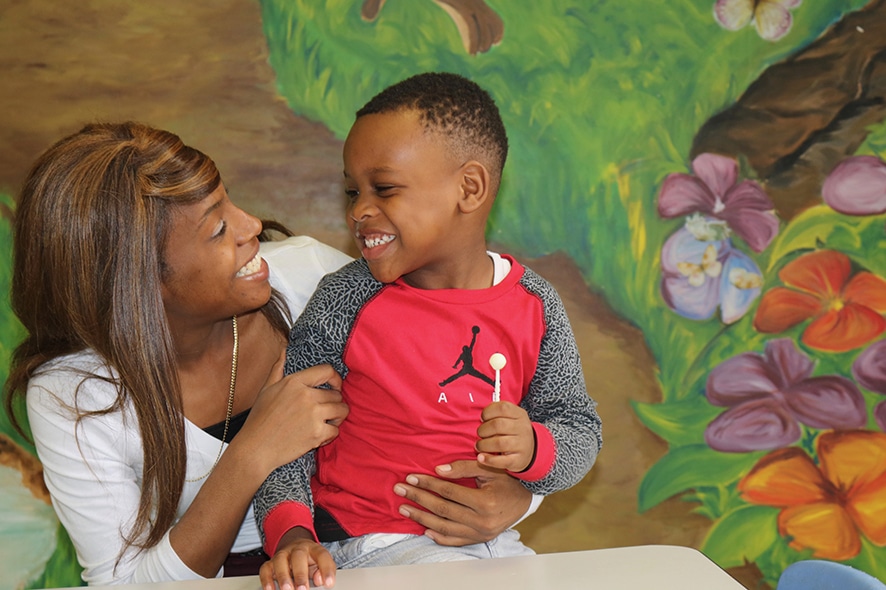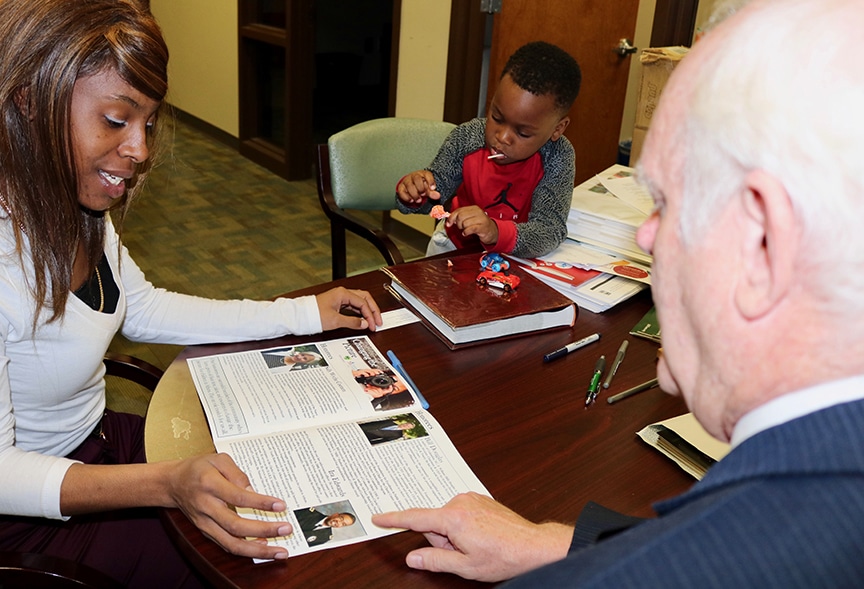Student-Parents—Struggling to Make the Grade

By Diana St. Lifer
A young woman stood alone on registration day at Athens Technical College in the center of a busy room bordered by tables stacked high with information. When the visibly overwhelmed teenager caught Tim Johnson’s attention, the Family Connection of Athens/Communities in Schools executive director approached her to offer some assistance.
“I asked if she was a student,” Johnson recalled. “She said, ‘I guess so. I just registered.’ When I asked if she was a parent, she lit up and said, ‘Yes, I have a 9-month-old baby. So I’m not sure I’ll be able to do this.’”
That’s when Johnson introduced her to Danielle Newsome. A student and single mother herself, Newsome helps other student-parents. Her work is supported by a Two-Gen Innovation Grant, which connects early learning, postsecondary, and workforce systems to deliver benefits to children and their parents.
“Danielle expresses real empathy. She is able to say, ‘I know how you feel, but you can do this,’” said Johnson of Newsome, who spent that registration day walking around with the young mother, identifying resources available to student-parents including information about child care options.
It was the guidance Newsome wished she had when she decided to continue her education after becoming a mother. “It’s not easy navigating the process,” said the 25 year old, who’s working toward a degree in health care information technologies. “It takes a lot of patience and you can’t be afraid to ask questions.”
No stranger to systems, Newsome was placed into foster care at age 3, lived in four homes, and was sexually assaulted before being adopted at age 7. She became pregnant at 21 and was a victim of domestic violence.
“Being a single parent is a lot of responsibility and it helped me to grow up a lot,” said Newsome, who balanced three jobs at a day care center, warehouse, and fast food restaurant while caring for a newborn. She lived with Isaiah’s father for a short while, but eventually she and her son had to move in with her adoptive family.
Determined to create a better future, Newsome enrolled herself in Athens Tech and Isaiah in Early Head Start—after spending time researching, making phone calls, and asking many questions.
Newsome, who said Isaiah is her motivation to pursue an education, has become a voice and resource for parents and their children through her work with Family Connection. She helps parents complete school applications, apply for financial aid, and learn about affordable child care and transportation.
“Working the system is a combination of aggressiveness and gentleness,” she explained. “You have to repeatedly explain what the problems and obstacles are and how they can help. You have to ask a lot of questions and understand you’re going to be bounced around like a ball. This is what a lot of single moms experience and I see that on a daily basis.”
In 2015-16, 27 percent of all students enrolled in the Technical College System of Georgia were women with dependents. Newsome helps other student-parents understand the process while also relating to their emotions. “They know they can depend on me to get them off the ground because I’ve been where they are,” she said.
Johnson emphasized the need for a more systematic approach to disseminating school-related information and resources to parents.
“While there could always be more resources, one of the biggest challenges is that parents aren’t aware of what’s available. Unfortunately, the student support offices don’t always have that knowledge,” said Johnson. “Danielle has been able to connect with parents as someone who has been through the experience.”

Bright from the Start: Georgia Department of Early Care and Learning Commissioner Amy M. Jacobs said Newsome’s work filling the gap is an excellent example of the need for social capital for families to be successful.
“Sometimes when we try to determine the best ways to help families succeed, we look only at systems,” said Jacobs. “We’re good at identifying early learning, postsecondary, workforce skills, and transportation. But the most effective way to optimize all those systems is to increase families’ social capital—connecting people, institutions, and resources.”
For the one in every four college students nationwide who is a parent, advocates like Newsome are invaluable in the long term. It’s predicted that 60 percent of jobs in Georgia by 2025 will require a postsecondary credential.
“Only 40 percent of our working-age population meets that requirement,” Jacobs explained. “For Georgia to be economically successful, we must drastically increase the percentage of young families that have a member of the household with a postsecondary degree.”
For single parents, that means overcoming time, money, and child care barriers presented by working and going to school. Having more people like Newsome with boots on the ground to recruit, enroll, and provide support will help families and communities thrive.
“Making sure all adults have access to postsecondary credentials is a surefire way to ensure economic health—for families and our state,” Jacobs said. “The question is, how can we help families build a network of social connections that encourage and enable mutual success?”
Newsome is a strong and supportive asset in constructing that network. She often does outreach where parents gather—from family literacy nights and back-to-school fairs, to posting information on bulletin boards at early learning programs and Head Start.
While strolling the Athens Technical College campus, Newsome often sees that teenaged mother she met at registration day. When she does, she is greeted by a grateful hug that reminds her she is making a difference.
